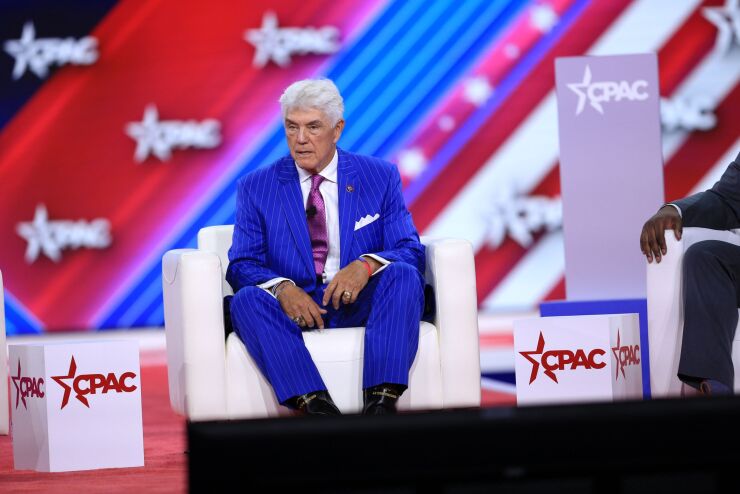[ad_1]

Dylan Hollingsworth/Bloomberg
WASHINGTON — The House has voted to nullify the Consumer Financial Protection Bureau’s small-business data-collection rule. The next stop for the legislation is the desk of President Joe Biden, who is expected to veto it.
The bill passed in a 221-202 vote on Friday. While the vote was driven by Republicans, six Democrats also voted in favor: Reps. Ed Case of Hawaii, Henry Cuellar of Texas, Jared Golden of Maine, Kathy Manning of North Carolina, Mary Peltola of Alaska and Marie Gluesenkamp Perez of Washington.
An identical Senate bill adopted in October was backed by Republicans and three Democrats.
The rule — issued in March — would require banks, fintechs and other lenders to collect race, gender and demographic information before making loans to small businesses. The requirements are similar to those for mortgage lending. The industry has opposed the rule, saying that it would be overly burdensome to lenders and require too much of small businesses.
“The CFPB’s rule is overly broad,” Rep. Roger Williams, R-Texas, said in opening remarks on the House floor Friday morning. “It will require lenders to collect massive amounts of data whenever a small-business owner applies for credit. Most of the information is unnecessary to make a fair, equitable, safe and sound loan. Requiring lenders to provide this information infringes on small-business owners’ right to privacy about their personal and business information when applying for credit.”
Rep. George Santos, R-N.Y., voted present just moments before the House voted to expel him.
The vote sends the challenge to Biden’s desk, where he has already said he will veto it.
Still, successful challenges to regulations are rare, and passing the resolution in both chambers, especially when they are controlled by different parties, is significant.
“I don’t think it’s very significant in the short-term, but the vote would give plenty of political cover to any future CFPB director who wants to revise it or start over,” said Ian Katz, managing director at Capital Alpha Partners. “That doesn’t mean it would get redone, but certainly any CFPB director who is inclined to take a look at it will know they have congressional support for doing so.”
Jaret Seiberg, a managing director and financial policy analyst at TD Cowen, said that the vote lets lawmakers “have their cake and eat it, too.”
“As everyone knows President Biden will veto the resolution, this is effectively a free vote for Congress,” he said. “A lawmaker can get credit for voting to repeal the rule without worrying about being held responsible for the consequences of that vote as there won’t be any consequences.”
The House vote to nullify the rule, known as Section 1071, quickly drew ire from community activists and praise from bank trade groups.
“Today’s vote for a move President Biden will veto was a pointless show put on for bank industry donors who still don’t know how to say yes to a good idea,” said Jesse Van Tol, president and CEO of the National Community Reinvestment Coalition. “The public, the banking industry and the economy will all benefit from the implementation of a Section 1071 final rule which gave banks some of what they asked for. All the House majority accomplished today was to make their next phone call with a bank lobbyist go a little smoother.”
The American Bankers Association said in a statement that the rule would “discourage bank lending to small businesses given the cost to collect this data.” The implementation of the small-business data-collection rule is already put on hold by litigation the ABA has filed against the CFPB.
“Given the similar bipartisan vote in the Senate, President Biden should recognize that Congress has spoken and rejects the CFPB’s flawed rule given the harm it would cause small businesses across the country and the banks that support them,” Rob Nichols, ABA president and CEO, said in the statement.
[ad_2]
Source link
